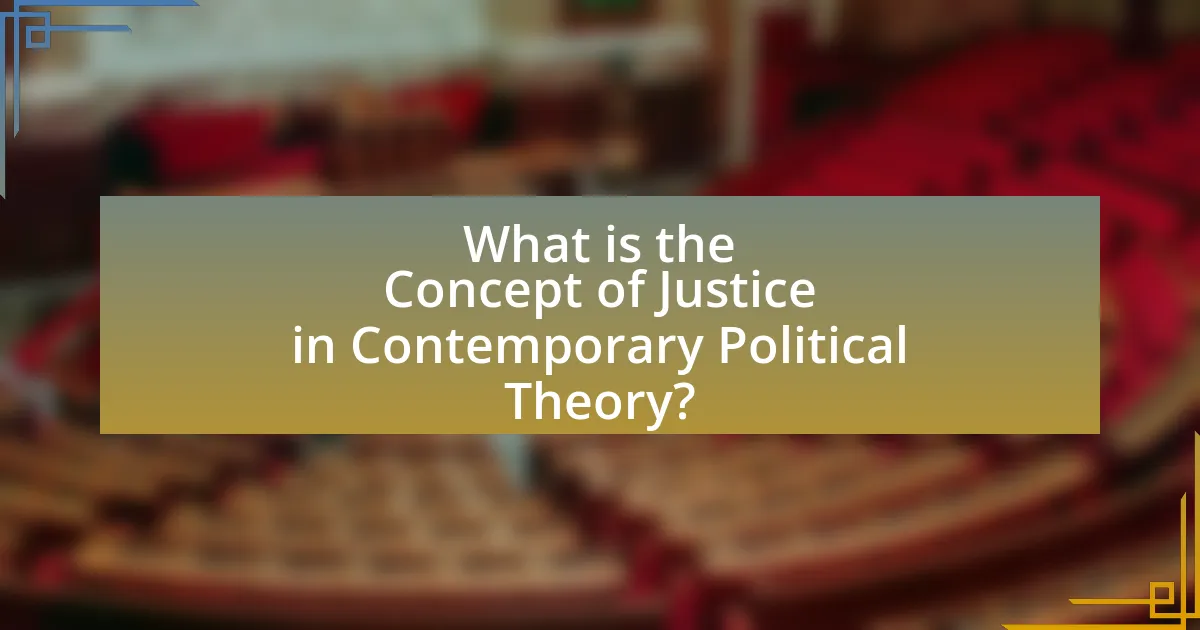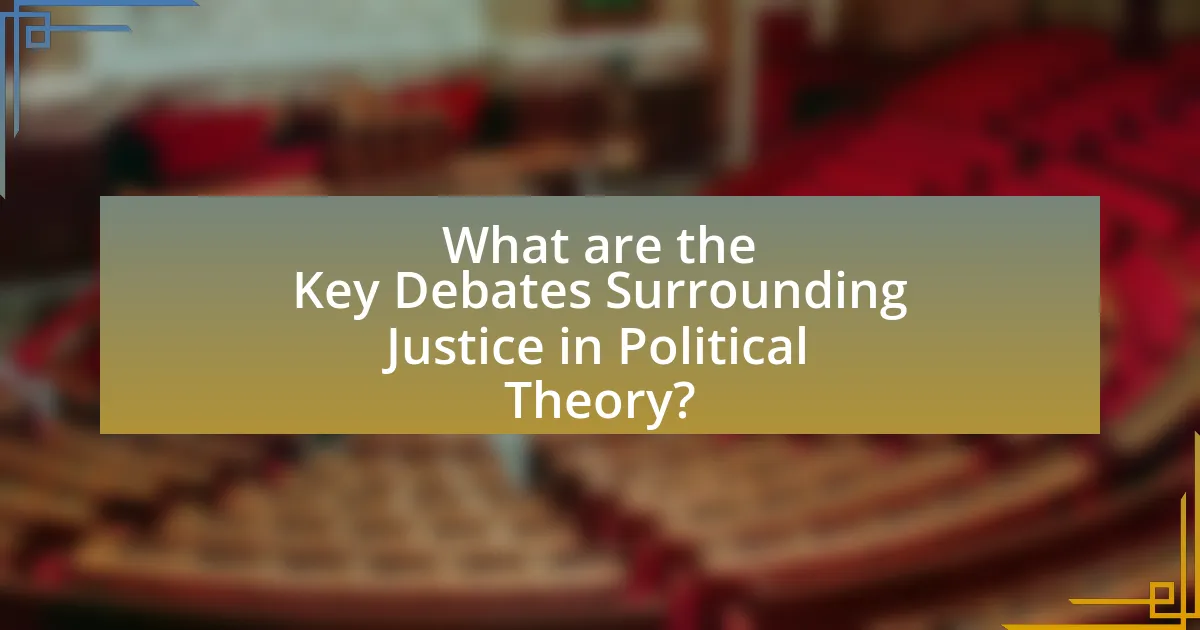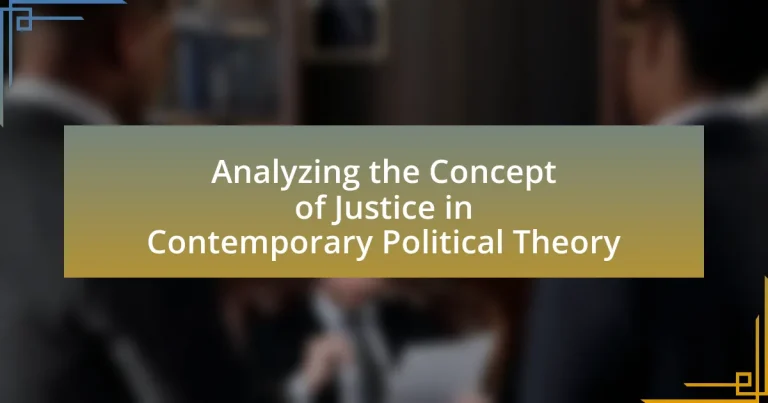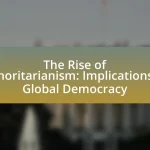The article analyzes the concept of justice in contemporary political theory, focusing on principles such as fairness, equality, and resource distribution. It explores the evolution of justice definitions, historical influences, and varying interpretations across political ideologies. Key debates surrounding justice, including the distinctions between distributive and retributive justice, are examined alongside criticisms of existing theories. The article also highlights the role of justice in policy-making, the impact of social movements, and practical steps individuals can take to promote justice within their communities.

What is the Concept of Justice in Contemporary Political Theory?
The concept of justice in contemporary political theory primarily revolves around the principles of fairness, equality, and the distribution of resources and opportunities. Prominent theorists like John Rawls advocate for a “veil of ignorance” approach, which suggests that justice should be determined without knowledge of one’s social position, ensuring impartiality in the creation of societal rules. This framework emphasizes that a just society is one where inequalities are arranged to benefit the least advantaged, as articulated in Rawls’ “A Theory of Justice.” Additionally, contemporary discussions often incorporate perspectives from feminist theory, critical race theory, and postcolonial theory, which challenge traditional notions of justice by highlighting systemic inequalities and advocating for a more inclusive understanding of justice that addresses historical injustices and power dynamics.
How has the definition of justice evolved in modern political thought?
The definition of justice in modern political thought has evolved from a focus on retributive and distributive justice to encompass broader concepts such as social justice and restorative justice. Historically, philosophers like John Rawls introduced the idea of justice as fairness, emphasizing equal distribution of resources and opportunities, which marked a significant shift from earlier notions that prioritized punishment or strict legalistic interpretations. This evolution reflects a growing recognition of systemic inequalities and the need for justice to address not only individual rights but also collective social conditions. For instance, contemporary theorists like Martha Nussbaum advocate for capabilities-based approaches, arguing that justice should ensure individuals have the means to achieve well-being, further expanding the scope of justice beyond mere legal frameworks.
What historical influences shaped contemporary views on justice?
Contemporary views on justice are shaped by historical influences such as Enlightenment philosophy, legal reforms, and social movements. Enlightenment thinkers like John Locke and Jean-Jacques Rousseau emphasized individual rights and the social contract, which laid the groundwork for modern democratic principles and justice systems. Legal reforms in the 19th and 20th centuries, including the abolition of slavery and the establishment of human rights laws, further influenced contemporary justice by promoting equality and fairness. Additionally, social movements, such as the civil rights movement and feminist movements, have challenged existing norms and expanded the understanding of justice to include issues of race, gender, and economic inequality. These historical influences collectively inform current debates and frameworks surrounding justice in political theory.
How do different political ideologies interpret justice?
Different political ideologies interpret justice in distinct ways, reflecting their foundational beliefs and values. For example, liberalism emphasizes individual rights and equality before the law, advocating for justice as fairness and the protection of personal freedoms. In contrast, conservatism often views justice through the lens of tradition and social order, prioritizing stability and the maintenance of established norms. Socialism interprets justice as economic equality, arguing that true justice requires addressing systemic inequalities and redistributing resources to achieve a fair society. Additionally, libertarianism defines justice primarily in terms of individual liberty, asserting that justice is served when individuals are free to act as they choose, provided they do not infringe on the rights of others. Each ideology’s interpretation of justice is shaped by its broader philosophical commitments, influencing policies and societal structures.
Why is justice considered a fundamental principle in political theory?
Justice is considered a fundamental principle in political theory because it establishes the foundation for fairness, equality, and the rule of law within a society. Political theorists, such as John Rawls, argue that justice ensures that individuals receive what they are due, promoting social cooperation and stability. Theories of justice, like Rawls’ “A Theory of Justice,” emphasize principles such as the “veil of ignorance,” which posits that societal rules should be designed without knowledge of one’s own social position, thereby ensuring impartiality. This concept has been influential in shaping modern democratic frameworks and policies aimed at reducing inequality and protecting individual rights, demonstrating that justice is essential for a functioning and equitable political system.
What role does justice play in the legitimacy of political systems?
Justice is fundamental to the legitimacy of political systems as it establishes the moral foundation upon which authority is exercised. When a political system is perceived as just, it fosters trust and compliance among citizens, leading to stability and social cohesion. For instance, John Rawls’ theory of justice emphasizes fairness and equality, arguing that a just society ensures that institutions operate in a manner that benefits all, particularly the least advantaged. Empirical studies, such as those conducted by the World Justice Project, demonstrate that societies with higher levels of perceived justice experience greater political legitimacy and citizen engagement. Thus, justice not only legitimizes authority but also enhances the effectiveness and resilience of political systems.
How does justice relate to concepts of equality and fairness?
Justice is fundamentally intertwined with the concepts of equality and fairness, as it seeks to ensure that individuals receive what they are due based on their rights and needs. In political theory, justice is often defined as the equitable distribution of resources and opportunities, which directly relates to the principle of equality, where all individuals are treated with the same level of respect and consideration. Fairness, on the other hand, emphasizes the impartiality of processes and outcomes, ensuring that decisions are made without bias or favoritism.
For instance, John Rawls’ theory of justice articulates the “veil of ignorance” concept, which posits that principles of justice should be determined without knowledge of one’s social status or personal characteristics, thereby promoting equality and fairness in societal structures. This theoretical framework illustrates how justice operates as a mechanism to balance individual rights with collective welfare, reinforcing the necessity of both equality and fairness in achieving a just society.
What are the main theories of justice in contemporary discourse?
The main theories of justice in contemporary discourse include distributive justice, retributive justice, restorative justice, and social justice. Distributive justice focuses on the fair allocation of resources and benefits among individuals, often associated with philosophers like John Rawls, who argued for principles of justice that ensure fairness and equality. Retributive justice emphasizes punishment for wrongdoing, advocating that offenders should receive consequences proportional to their actions, as discussed by theorists such as Immanuel Kant. Restorative justice seeks to repair harm by involving all stakeholders in the resolution process, promoting healing rather than punishment, a concept supported by scholars like Howard Zehr. Social justice encompasses a broader view, advocating for systemic change to address inequalities and promote human rights, as articulated by thinkers like Amartya Sen and Martha Nussbaum. Each of these theories contributes to the ongoing dialogue about justice in contemporary political theory, reflecting diverse perspectives on fairness, accountability, and societal well-being.
What distinguishes distributive justice from retributive justice?
Distributive justice focuses on the fair allocation of resources and benefits among individuals in society, while retributive justice emphasizes the appropriate response to wrongdoing, typically through punishment. Distributive justice seeks to ensure that individuals receive their fair share based on criteria such as need, merit, or equality, as seen in theories proposed by philosophers like John Rawls. In contrast, retributive justice is concerned with establishing a moral balance by imposing penalties on those who violate laws or social norms, as articulated in the works of thinkers like Immanuel Kant. This distinction highlights the different objectives of each concept: one aims for equitable distribution, while the other seeks to address and rectify injustices through punitive measures.
How do social contract theories contribute to our understanding of justice?
Social contract theories contribute to our understanding of justice by framing it as a mutual agreement among individuals to form a society that protects their rights and promotes fairness. These theories, articulated by philosophers such as Thomas Hobbes, John Locke, and Jean-Jacques Rousseau, emphasize that justice arises from the consent of the governed, establishing a foundation for legal and moral obligations. For instance, Locke’s theory posits that individuals consent to surrender certain freedoms in exchange for the protection of their natural rights, thereby linking justice to the preservation of life, liberty, and property. This framework helps clarify the relationship between individual rights and collective responsibilities, illustrating how societal structures can be designed to achieve equitable outcomes.

What are the Key Debates Surrounding Justice in Political Theory?
Key debates surrounding justice in political theory include the tension between distributive justice and retributive justice, the role of individual rights versus collective good, and the implications of justice in relation to social equality and economic disparity. Distributive justice focuses on the fair allocation of resources, as discussed by theorists like John Rawls, who argues for principles of justice that ensure fairness in social cooperation. In contrast, retributive justice emphasizes punishment and accountability, raising questions about moral responsibility and societal norms. Additionally, the debate over individual rights, as championed by libertarians, versus the collective good, supported by communitarian perspectives, highlights differing views on the role of the state and community in achieving justice. These discussions are further complicated by considerations of systemic inequalities, as seen in the works of scholars like Amartya Sen, who emphasizes capabilities and social justice.
What are the major criticisms of existing theories of justice?
Major criticisms of existing theories of justice include their perceived lack of universality, failure to address systemic inequalities, and overemphasis on individualism. Critics argue that many theories, such as John Rawls’ theory of justice as fairness, do not adequately account for cultural differences and the diverse needs of various communities, leading to a one-size-fits-all approach that may not be applicable in all contexts. Additionally, theories often overlook the structural factors that perpetuate inequality, such as race, gender, and class disparities, which can result in unjust outcomes despite adherence to theoretical principles. Furthermore, the focus on individual rights and responsibilities can neglect the importance of collective social responsibilities and the role of community in achieving justice. These criticisms highlight the need for a more inclusive and context-sensitive approach to justice that considers both individual and collective dimensions.
How do critics argue against utilitarian approaches to justice?
Critics argue against utilitarian approaches to justice by highlighting that such frameworks can lead to the neglect of individual rights in favor of the greater good. For instance, philosophers like John Rawls contend that utilitarianism fails to account for the distribution of justice, as it may justify sacrificing the welfare of a minority if it benefits the majority. This perspective is supported by the idea that utilitarianism can lead to morally questionable outcomes, such as justifying harmful actions against individuals if they result in a net increase in overall happiness. Additionally, critics emphasize that utilitarianism lacks a clear method for measuring happiness or utility, making it difficult to apply consistently in real-world scenarios.
What are the limitations of Rawlsian justice in contemporary society?
Rawlsian justice faces several limitations in contemporary society, primarily due to its reliance on idealized conditions that may not reflect real-world complexities. One significant limitation is its assumption of a well-ordered society, which overlooks systemic inequalities and power dynamics that persist in modern contexts. For instance, Rawls’ principles of justice, such as the difference principle, may not adequately address the needs of marginalized groups who experience intersectional disadvantages. Additionally, the focus on distributive justice can neglect other forms of justice, such as restorative or procedural justice, which are crucial in addressing historical injustices and fostering social cohesion. Furthermore, critics argue that Rawlsian justice does not sufficiently account for global inequalities, as it primarily centers on domestic frameworks, leaving issues of global poverty and injustice unaddressed. These limitations highlight the challenges of applying Rawlsian principles in a diverse and interconnected world.
How do contemporary issues influence debates on justice?
Contemporary issues significantly influence debates on justice by shaping public perceptions and policy priorities. For instance, the rise of social movements advocating for racial equality, such as Black Lives Matter, has prompted discussions on systemic racism and its implications for justice systems. Research indicates that these movements have led to increased scrutiny of law enforcement practices and calls for reform, highlighting the need for equitable treatment under the law. Additionally, issues like climate change have introduced debates on environmental justice, emphasizing the disproportionate impact on marginalized communities. This intersection of contemporary issues with justice debates illustrates how societal challenges drive the evolution of justice concepts and policies.
What impact do globalization and migration have on justice discussions?
Globalization and migration significantly influence justice discussions by reshaping the frameworks through which rights and responsibilities are understood. The interconnectedness brought about by globalization leads to a re-evaluation of national boundaries and the distribution of resources, prompting debates on global justice and equity. For instance, the influx of migrants often raises questions about social justice, citizenship rights, and the obligations of host countries to provide for newcomers. Research by the International Organization for Migration indicates that migration can enhance economic growth but also necessitates policies that address inequalities and protect vulnerable populations. This dynamic interplay between globalization and migration thus compels a broader and more inclusive discourse on justice, emphasizing the need for policies that consider both local and global contexts.
How do environmental concerns reshape our understanding of justice?
Environmental concerns reshape our understanding of justice by introducing the concept of ecological justice, which emphasizes the interdependence of human rights and environmental sustainability. This perspective argues that justice cannot be fully realized without addressing environmental degradation, as marginalized communities often bear the brunt of ecological harm. For instance, studies show that low-income populations are disproportionately affected by pollution and climate change, highlighting the need for equitable resource distribution and environmental protections. Consequently, integrating environmental considerations into justice frameworks leads to a more holistic approach that recognizes the rights of both people and the planet.

How is Justice Applied in Contemporary Political Contexts?
Justice is applied in contemporary political contexts through frameworks that emphasize equality, fairness, and the rule of law. Political systems often implement justice by enacting laws that protect individual rights and promote social equity, as seen in various democratic nations where legislation addresses issues like discrimination and access to resources. For instance, the Civil Rights Act of 1964 in the United States aimed to eliminate racial discrimination, reflecting a commitment to justice in societal structures. Additionally, contemporary political discourse frequently incorporates restorative justice principles, focusing on rehabilitation and reconciliation rather than punitive measures, which is evident in criminal justice reforms in countries like New Zealand. These applications demonstrate how justice is operationalized to address societal inequalities and uphold democratic values.
What role does justice play in policy-making and governance?
Justice serves as a foundational principle in policy-making and governance, guiding the creation and implementation of laws and regulations to ensure fairness and equity. In democratic societies, justice influences the development of policies that address social inequalities, protect individual rights, and promote the common good. For example, the establishment of civil rights legislation in the United States during the 1960s aimed to rectify systemic injustices faced by marginalized communities, demonstrating how justice can drive significant policy changes. Furthermore, theories of justice, such as those proposed by John Rawls, emphasize the importance of fairness in the distribution of resources and opportunities, which policymakers often incorporate into governance frameworks to achieve social justice.
How do justice principles inform laws and regulations?
Justice principles inform laws and regulations by establishing foundational ethical standards that guide the creation and enforcement of legal frameworks. These principles, such as fairness, equality, and accountability, ensure that laws reflect societal values and promote the common good. For instance, the principle of equality underpins anti-discrimination laws, which aim to protect individuals from unfair treatment based on characteristics like race or gender. Historical documents, such as the Universal Declaration of Human Rights, emphasize the importance of justice principles in shaping laws that uphold human dignity and rights. Thus, justice principles serve as a critical lens through which laws and regulations are evaluated and developed, ensuring they align with ethical standards and societal expectations.
What examples illustrate the application of justice in public policy?
Examples illustrating the application of justice in public policy include affirmative action policies, which aim to rectify historical inequalities by promoting opportunities for marginalized groups. For instance, the United States’ Higher Education Act includes provisions for federal funding to support minority-serving institutions, thereby addressing educational disparities. Another example is the implementation of restorative justice programs in the criminal justice system, which focus on rehabilitation and reconciliation rather than punishment, as seen in New Zealand’s youth justice system that emphasizes community involvement and victim support. These examples demonstrate how public policy can embody principles of justice by actively working to create equitable outcomes and address systemic injustices.
How do social movements advocate for justice in society?
Social movements advocate for justice in society by mobilizing collective action to challenge systemic inequalities and promote social change. They utilize strategies such as protests, advocacy campaigns, and grassroots organizing to raise awareness about injustices, influence public opinion, and pressure policymakers. For example, the Civil Rights Movement in the United States effectively used nonviolent protests and legal challenges to dismantle segregation laws, leading to significant legislative changes like the Civil Rights Act of 1964. This demonstrates how social movements can create tangible shifts in societal norms and legal frameworks, thereby advancing justice.
What strategies do movements use to promote justice-related issues?
Movements use various strategies to promote justice-related issues, including grassroots organizing, advocacy, coalition-building, and public awareness campaigns. Grassroots organizing empowers individuals at the community level to mobilize support and drive change, exemplified by movements like Black Lives Matter, which has effectively utilized local chapters to address systemic racism. Advocacy involves lobbying policymakers and influencing legislation, as seen in the LGBTQ+ rights movement, which has successfully pushed for legal reforms such as marriage equality. Coalition-building brings together diverse groups to amplify voices and resources, demonstrated by environmental justice movements that unite social justice and ecological concerns. Public awareness campaigns leverage media and social platforms to educate the public and shift perceptions, as evidenced by campaigns against gender-based violence that have sparked global conversations. These strategies collectively enhance visibility and urgency around justice-related issues, fostering societal change.
How effective are these movements in influencing political change?
Social movements are highly effective in influencing political change, as evidenced by historical examples such as the Civil Rights Movement in the United States, which led to significant legislative reforms like the Civil Rights Act of 1964. These movements mobilize public opinion, create awareness, and apply pressure on political institutions, resulting in policy changes and shifts in societal norms. For instance, the Women’s Suffrage Movement successfully secured voting rights for women in many countries, demonstrating the power of organized activism in achieving political goals.
What practical steps can individuals take to promote justice in their communities?
Individuals can promote justice in their communities by actively participating in local governance and advocacy efforts. Engaging in community meetings allows individuals to voice concerns and influence decision-making processes that affect local policies. Additionally, volunteering with organizations that focus on social justice issues, such as poverty alleviation or racial equality, can create tangible impacts. Research shows that grassroots movements, like those led by community organizers, have successfully brought about policy changes, demonstrating the effectiveness of collective action. Furthermore, educating oneself and others about rights and legal resources empowers communities to stand against injustices. Studies indicate that informed citizens are more likely to engage in civic activities, thereby fostering a culture of justice.


